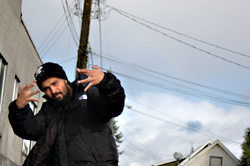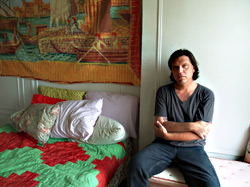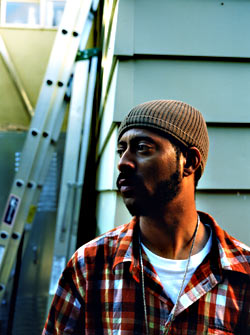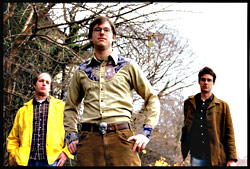Seattle MC Gabriel Teodros’ serene voice lights up when asked about the state of Northwest hip-hop. “There’s no other scene like it,” he effuses, and this South Seattle native certainly has the musical résumé to back this statement up. After moving to Las Vegas during his high-school years, he returned to Seattle in 1999, forming Abyssinian Creole with partner Khalil Crisis. The group still exists, but these days Teodros has been very busy working on his new solo effort, Lovework.
The biracial rapper struggled to find his cultural and political identity while growing up. His father, a “Marxist communist who doesn’t believe God exists,” is white. His mother, a born-again Christian, is Ethiopian. “I was the lightest-skinned person [on the Ethiopian side of] my family,” he recalls. “I had to make up my own mind at an early age of who I was gonna be.” But as a teenager, he found the answer to his struggle for identification in hip-hop. “For a long time, if you asked me what race I was…I would say hip-hop before anything else, just to be difficult. But also because I felt like that was the only community that fully embraced who I was. It’s through hip-hop that I got back to embracing…who I am culturally. It came full circle in my life.”
On Lovework, Teodros ponders issues of racism, sexism, and colonialism, as well as lighter topics like romance and the art of rhyme, over the silky, jazzy beats of producer Amos Miller. The record is a unified effort, tied together by Miller’s production and Teodros’ swift wordplay. “I feel like it captured a moment, which is all I was intending to do,” he says, describing the recording process. “That’s all I really try to do with music, take a little photograph.”
Teodros’ musical snapshots cover a wide array of both the political and personal. “Raccoon Rock,” a collaboration with MC/vocalist Toni Hill, is an introspective look at the issues of sexism and domestic abuse, but it never feels heavy-handed, as the pair’s obvious pleasure in working together comes through even while dealing with such serious topics. “Everything is political,” says Teodros, “but I try to give you a window into my own world instead of just putting out a message that doesn’t have an identity to it. So-called political rappers talk about issues without ever letting you know who they are. I wanna know who’s talking to me.”
And we do indeed get to know him over the course of Lovework. “No Label,” a collaboration with longtime friend Moka Only, is another smooth banger on which Teodros clearly states that he won’t and can’t be pegged into any category, even if people tend to lump him into the “conscious rap” genre. But pigeonholing doesn’t sit very well with him. “I miss the days of hip-hop when those categories didn’t exist,” he reminisces. “I come from the same neighborhood, the same background as all the so-called hood rappers or gangsta rappers. I feel like they’re conscious rappers, too, the ones that are actually speaking about their lives and not imitating what they think people want to hear. They’re doing what Chuck D said: street reportage, which is what I do. I never had guns, though, so I can’t talk about that. I have to talk about what I went through.”
“Hip-hop macho bravado ego/Battles, guns, drugs, thugs and not really much more/My people, what’s going on?/Tell me where we went wrong,” rhymes Teodros on the standout track, “Chili Sauce” (one of his favorites). “I don’t feel too positive about any mainstream hip-hop that’s being put out there right now,” he explains. “Everyone’s imitating each other…. That is true for underground hip-hop as well.”
But this MC sees the local scene as an answer to the fakers, capable of creating its own supportive community. “It is happening…with the label I’m working on, Massline. We sold out the Showbox for our label launch. That’s the first time that’s happened since Sir-Mix-a-Lot, back in the day. It’s big for Seattle.” And Teodros’ Lovework is a positive, innovative link in his hometown’s musical chain. “Every day people are supporting homegrown hip-hop. Seattle has had the talent for years to stand out from the rest as its own scene with its own unique sound.”








